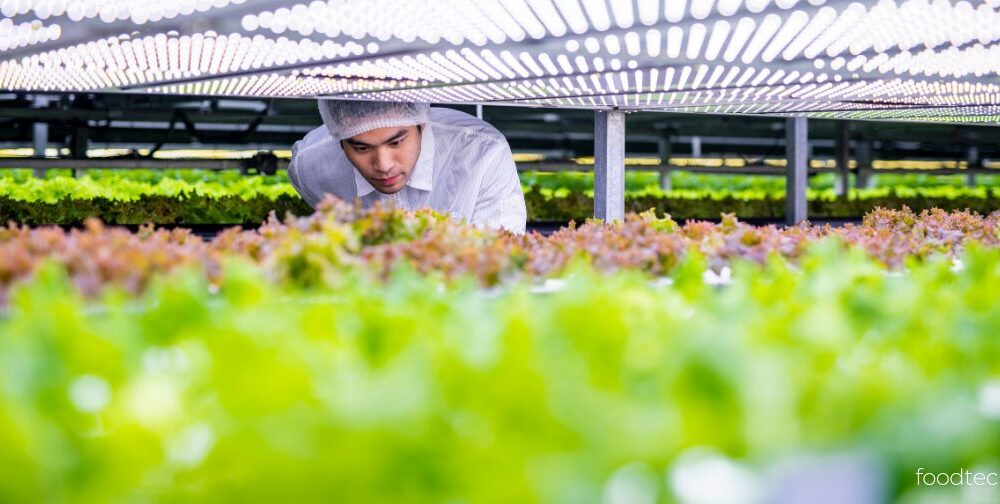Tech Is Shaping the Future of Food: Here's How Venture Capital is Carrying that Tech Across the Finish Line

The food industry is a massive, multi-trillion-dollar industry that affects each one of us, presenting massive opportunities for investment on both the public and private sides. In fact, the USDA reports that the food service and food retail industries supplied $2.6 trillion worth of food in the U.S. in 2023 alone.
Challenges posed by the food industry
Unfortunately though, the food industry is also one of the largest emitters of greenhouse gasses in the world. In fact, one-third of global greenhouse gas emissions caused by human activity come from the food industry.
Additionally, the size of the global population is exploding, surpassing 8 billion in November 2022. The United Nations estimates that the population will hit 9.7 billion by 2050.
As such, we will be hard-pressed to achieve net-zero carbon emissions or meet the needs of a growing global population without some major changes to the food industry that only technology can fix.
Funding foodtech
Currently, the key to funding this technology lies largely in the private sector. While a few food-technology companies have gone public, the lion’s share of these companies remain private, with many of them still in startup mode. The result is massive and growing opportunities for venture capital (VC) in foodtech.
Of course, venture capitalists are always looking ahead to how their investment is going to pay off, and in foodtech, the greater opportunities lie in strategic mergers and acquisitions and trade sales rather than initial public offerings. According to venture capital firm Peakbridge, the top 10 food and ingredient companies spend only about $4 billion to $5 billion per year on research and development — while averaging $22 billion in spending annually on M&A.
Data from Pitchbook reveals that in the third quarter, $2.7 billion worth of VC deals were completed, up 10.7% quarter over quarter. Over the past year, there have been 95 foodtech exits from VC, including 69 acquisitions and 18 buyouts.
Success stories found in M&A
Robust financial results have built up record levels of cash on the balance sheets of strategic acquirers, setting the stage for more increases in M&A, especially as many also pivot toward consumer preferences for natural and clean-label products.
Massive food conglomerates are delving into the food technology space to try to keep up, like through the expansion of Cargill’s partnership with alternative protein startup ENOUGH and Buhler Group’s Swiss food innovation hub, which is developing sustainable foods like plant-based meat. Other companies are turning to M&A and other deals in the foodtech space, like International Flavors & Fragrances. Kraft also entered a joint venture with foodtech startup TheNotCompany to develop plant-based products.
All these strategic deals demonstrate the rich deal-making environment for VC in foodtech. In fact, several VC firms specializing in foodtech have wasted no time tapping into the opportunities.
Investing in fermentation
For example, Earth First Food Ventures is focused on smart proteins, believing that the rapidly expanding global population needs alternative protein sources that are less damaging to the environment than the animal-based production currently practiced.
More specifically, EFFV invests in plant-based, fermentation and cultivated assets. The firm’s investments include a Series C funding round in EVERY. EVERY uses precision fermentation to create proteins and functional ingredients without animals by decoupling the proteins from the animals that make them. The company’s products include protein bars and protein water, plant-based patties, and even chocolate-chip cookie baking mix.
EFFV is also in discussions with other U.S. and European companies to participate in their upcoming B, C and D funding rounds.
Eliminating food waste
Meanwhile, Better Food Ventures (BFV) targets companies that harness the power of information technology to improve the food system. Using its framework of “positive impact,” the firm looks for early-stage, scalable, game-changing technologies in food and agriculture.
BFV looks to several categories for its investments: connectivity and agility, productivity and economic stability, sustainability and transparency, precision and personalization, and nutritional health and wellness. Some of the firm’s investments include Afresh and The Bountiful Company, which engaged in M&A a few years ago, when Nestle acquired its core brands.
Afresh is working to eliminate food waste and make fresh food accessible to everyone. The company reports that one-third of what we grow goes uneaten. Afresh works with grocers to improve their fresh food supply chain. According to the company, 44 million pounds of food waste have been prevented while carbon-dioxide emissions have been reduced by 24 million. Afresh claims to have saved 886 million gallons of water as well, thanks to the growing number of grocers who have adopted its technology platform.
Beyond food
Big Idea Ventures has invested in Bayou Best Foods and BioCloak, among other firms. Bayou BestFoods is developing premium, animal-free shellfish options, while BioCloak is a bioencapsulation technology that aims to replace petroleum-based encapsulation methods and materials. Big Idea is also investing in PlantSustain, a biocidal microbe technology company that aims to replace chemical fertilizers and pesticides.
Big Idea isn’t the only VC firm looking beyond food products in developing foodtech. Lever VC is also diving into agtech with its investment in HerdDogg, a digital animal health and analytics company that aims to reduce mortality and diseases on farms.
Lever VC has also invested in Boston Bioprocess, a CDMO service provider to companies producing novel food, beauty and industrial ingredients through fermentation.
Funding foodtech via VC
When foodtech companies go public, it’s often to much fanfare, although recent history tells us that it can take some time for such IPO investments to pay off. However, venture capital is presenting opportunities with much more immediate success than the public markets, as evidenced by the significant M&A activity in the private sector.
As a result, it’s easy to see why companies are staying private longer. According to Morningstar, the median age at which companies are going public has jumped from 6.9 years 10 years ago to 10.7 years in 2024, with record funding, regulatory changes and non-traditional investors supporting that trend.
Thus, with technology driving the future of the food industry and companies staying private longer, it’s clear that VC is the future of foodtech, at least in the near term.





